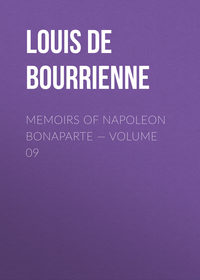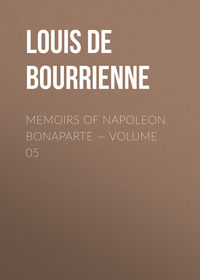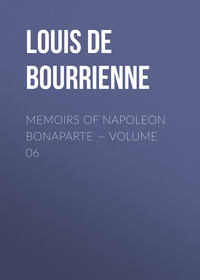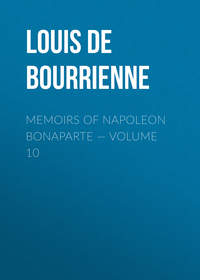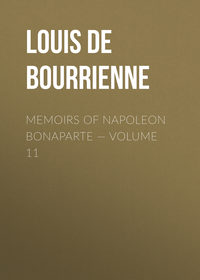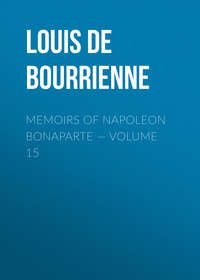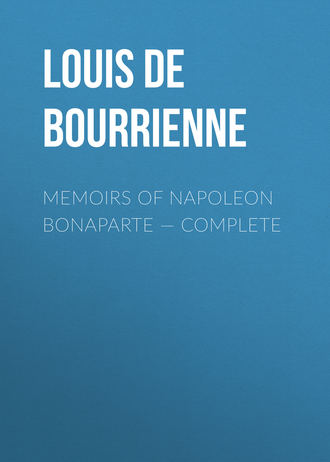 полная версия
полная версияMemoirs of Napoleon Bonaparte — Complete
—["It was," says the 'Memorial of St. Helena', "an illegal and tyrannical act, but still it was a necessary evil. It was the fault of the law. He was a hundred, nay, a thousand fold guilty, and yet it was doubtful whether he would be condemned. We therefore assailed him with the shafts of honour and public opinion. Yet I repeat it was a tyrannical act, and one of those violent measures which are at times necessary in great nations and in extraordinary circumstances."]—
Bonaparte, as I have before observed, loved contrasts; and I remember at the very time he was acting so violently against Latour-Foissac he condescended to busy himself about a company of players which he wished to send to Egypt, or rather that he pretended to wish to send there, because the announcement of such a project conveyed an impression of the prosperous condition of our Oriental colony. The Consuls gravely appointed the Minister of the Interior to execute this business, and the Minister in his turn delegated his powers to Florence, the actor. In their instructions to the Minister the Consuls observed that it would be advisable to include some female dancers in the company; a suggestion which corresponds with Bonaparte's note, in which were specified all that he considered necessary for the Egyptian expedition.
The First Consul entertained singular notions respecting literary property. On his hearing that a piece, entitled 'Misanthropie et Repentir', had been brought out at the Odeon, he said to me, "Bourrienne, you have been robbed."—"I, General? how?"—"You have been robbed, I tell you, and they are now acting your piece." I have already mentioned that during my stay at Warsaw I amused myself with translating a celebrated play of Kotzebue. While we were in Italy I lent Bonaparte my translation to read, and he expressed himself much pleased with it. He greatly admired the piece, and often went to see it acted at the Odeon. On his return he invariably gave me fresh reasons for my claiming what he was pleased to call my property. I represented to him that the translation of a foreign work belonged to any one who chose to execute it. He would not, however, give up his point, and I was obliged to assure him that my occupations in his service left me no time to engage in a literary lawsuit. He then exacted a promise from me to translate Goethe's 'Werther'. I told him it was already done, though indifferently, and that I could not possibly devote to the subject the time it merited. I read over to him one of the letters I had translated into French, and which he seemed to approve.
That interval of the Consular Government during which Bonaparte remained at the Luxembourg may be called the preparatory Consulate. Then were sown the seeds of the great events which he meditated, and of those institutions with which he wished to mark his possession of power. He was then, if I may use the expression, two individuals in one: the Republican general, who was obliged to appear the advocate of liberty and the principles of the Revolution; and the votary of ambition, secretly plotting the downfall of that liberty and those principles.
I often wondered at the consummate address with which he contrived to deceive those who were likely to see through his designs. This hypocrisy, which some, perhaps, may call profound policy, was indispensable to the accomplishment of his projects; and sometimes, as if to keep himself in practice, he would do it in matters of secondary importance. For example, his opinion of the insatiable avarice of Sieyès is well known; yet when he proposed, in his message to the Council of Ancients, to give his colleague, under the title of national recompense, the price of his obedient secession, it was, in the words of the message, a recompense worthily bestowed on his disinterested virtues.
While at the Luxembourg Bonaparte showed, by a Consular act, his hatred of the liberty of the press above all liberties, for he loved none. On the 27th Nivôse the Consuls, or rather the First Consul, published a decree, the real object of which was evidently contrary to its implied object.
This decree stated that:
The Consuls of the Republic, considering that some of the journals printed at Paris are instruments in the hands of the enemies of the Republic, over the safety of which the Government is specially entrusted by the people of France to watch, decree—
That the Minister of Police shall, during the continuation of the war, allow only the following journals to be printed and published, viz. (list of 20 publications) and those papers which are exclusively devoted to science, art, literature, commerce, and advertisements.
Surely this decree may well be considered as preparatory; and the fragment I have quoted may serve as a standard for measuring the greater part of those acts by which Bonaparte sought to gain, for the consolidation of his power, what he seemed to be seeking solely for the interest of the friends of the Republic. The limitation to the period of the continuance of the war had also a certain provisional air which afforded hope for the future. But everything provisional is, in its nature, very elastic; and Bonaparte knew how to draw it out ad infinitum. The decree, moreover, enacted that if any of the uncondemned journals should insert articles against the sovereignty of the people they would be immediately suppressed. In truth, great indulgence was shown on this point, even after the Emperor's coronation.
The presentation of swords and muskets of honour also originated at the Luxembourg; and this practice was, without doubt, a preparatory step to the foundation of the Legion of Honour.
—["Armes d'honneur," decreed 25th December 1799. Muskets for infantry, carbines for cavalry, grenades for artillery, swords for the officers. Gouvion St. Cyr received the first sword (Thiers, tome i. p. 126).]—
A grenadier sergeant, named Léon Aune, who had been included in the first distribution, easily obtained permission to write to the First Consul to thank him. Bonaparte, wishing to answer him in his own name, dictated to me the following letter for Aune:—
I have received your letter, my brave comrade. You needed not to have told me of your exploits, for you are the bravest grenadier in the whole army since the death of Benezete. You received one of the hundred sabres I distributed to the army, and all agreed you most deserved it.
I wish very much again to see you. The War Minister sends you an order to come to Paris.
This wheedling wonderfully favoured Bonaparte's designs. His letter to Aune could not fail to be circulated through the army. A sergeant called my brave comrade by the First Consul—the First General of France! Who but a thorough Republican, the stanch friend of equality, would have done this? This was enough to wind up the enthusiasm of the army. At the same time it must be confessed that Bonaparte began to find the Luxembourg too little for him, and preparations were set on foot at the Tuileries.
Still this great step towards the re-establishment of the monarchy was to be cautiously prepared. It was important to do away with the idea that none but a king could occupy the palace of our ancient kings. What was to be done? A very fine bust of Brutus had been brought from Italy. Brutus was the destroyer of tyrants! This was the very thing; and David was commissioned to place it in a gallery of the Tuileries. Could there be a greater proof of the Consul's horror of tyranny?
To sleep at the Tuileries, in the bedchamber of the kings of France, was all that Bonaparte wanted; the rest would follow in due course. He was willing to be satisfied with establishing a principle the consequences of which were to be afterwards deduced. Hence the affectation of never inserting in official acts the name of the Tuileries, but designating that place as the Palace of the Government. The first preparations were modest, for it did not become a good Republican to be fond of pomp. Accordingly Lecomte, who was at that time architect of the Tuileries, merely received orders to clean the Palace, an expression which might bear more than one meaning, after the meetings which had been there. For this purpose the sum of 500,000 francs was sufficient. Bonaparte's drift was to conceal, as far as possible, the importance he attached to the change of his Consular domicile. But little expense was requisite for fitting up apartments for the First Consul. Simple ornaments, such as marbles and statues, were to decorate the Palace of the Government.
Nothing escaped Bonaparte's consideration. Thus it was not merely at hazard that he selected the statues of great men to adorn the gallery of the Tuileries. Among the Greeks he made choice of Demosthenes and Alexander, thus rendering homage at once to the genius of eloquence and the genius of victory. The statue of Hannibal was intended to recall the memory of Rome's most formidable enemy; and Rome herself was represented in the Consular Palace by the statues of Scipio, Cicero, Cato, Brutus and Caesar—the victor and the immolator being placed side by side. Among the great men of modern times he gave the first place to Gustavus Adolphus, and the next to Turenne and the great Condé, to Turenne in honour of his military talent, and to Condé to prove that there was nothing fearful in the recollection of a Bourbon. The remembrance of the glorious days of the French navy was revived by the statue of Duguai Trouin. Marlborough and Prince Eugène had also their places in the gallery, as if to attest the disasters which marked the close of the great reign; and Marshal Sage, to show that Louis XV.'s reign was not without its glory. The statues of Frederick and Washington were emblematic of false philosophy on a throne and true wisdom founding a free state. Finally, the names of Dugommier, Dampierre, and Joubert were intended to bear evidence of the high esteem which Bonaparte cherished for his old comrades,—those illustrious victims to a cause which had now ceased to be his.
The reader has already been informed of the attempts made by Bonaparte to induce England and Austria to negotiate with the Consular Government, which the King of Prussia was the first of the sovereigns of Europe to recognise. These attempts having proved unavailing, it became necessary to carry on the war with renewed vigour, and also to explain why the peace, which had been promised at the beginning of the Consulate, was still nothing but a promise. In fulfilment of these two objects Bonaparte addressed an energetic proclamation to the armies, which was remarkable for not being followed by the usual sacred words, "Vive la République!"
At the same time Bonaparte completed the formation of the Council of State, and divided it into five sections:—(1) The Interior; (2) Finance; (3) Marine; (4) The War Department; (5) Legislation. He fixed the salaries of the Councillors of the State at 25,000 francs, and that of the Precedents of Sections at 30,000. He settled the costume of the Consuls, the Ministers, and the different bodies of the State. This led to the re-introduction of velvet, which had been banished with the old regime, and the encouragement of the manufactures of Lyons was the reason alleged for employing this un-republican article in the different dresses, such as those of the Consuls and Ministers. It was Bonaparte's constant aim to efface the Republic, even in the utmost trifles, and to prepare matters so well that the customs and habits of monarchy being restored, there should only then remain a word to be changed.
I never remember to have seen Bonaparte in the Consular dress, which he detested, and which he wore only because duty required him to do so at public ceremonies. The only dress he was fond of, and in which he felt at ease, was that in which he subjugated the ancient Eridanus and the Nile, namely, the uniform of the Guides, to which corps Bonaparte was always sincerely attached.
The masquerade of official dresses was not the only one which Bonaparte summoned to the aid of his policy. At that period of the year VIII. which corresponded with the carnival of 1800, masques began to be resumed at Paris. Disguises were all the fashion, and Bonaparte favoured the revival of old amusements; first, because they were old, and next, because they were the means of diverting the attention of the people: for, as he had established the principle that on the field of battle it is necessary to divide the enemy in order to beat him, he conceived it no less advisable to divert the people in order to enslave them. Bonaparte did not say 'panem et circenses', for I believe his knowledge of Latin did not extend even to that well-known phrase of Juvenal, but he put the maxim in practice. He accordingly authorised the revival of balls at the opera, which they who lived during that period of the Consulate know was an important event in Paris. Some gladly viewed it as a little conquest in favour of the old regime; and others, who for that very reason disapproved it, were too shallow to understand the influence of little over great things. The women and the young men did not bestow a thought on the subject, but yielded willingly to the attractions of pleasure. Bonaparte, who was delighted at having provided a diversion for the gossiping of the Parisian salons, said to me one day, "While they are chatting about all this, they do not babble upon politics, and that is what I want. Let them dance and amuse themselves as long as they do not thrust their noses into the Councils of the Government; besides, Bourrienne," added he, "I have other reasons for encouraging this, I see other advantages in it. Trade is languishing; Fouché tells me that there are great complaints. This will set a little money in circulation; besides, I am on my guard about the Jacobins. Everything is not bad, because it is not new. I prefer the opera-balls to the saturnalia of the Goddess of Reason. I was never so enthusiastically applauded as at the last parade."
A Consular decision of a different and more important nature had, shortly before, namely, at the commencement of Nivôse, brought happiness to many families. Bonaparte, as every one knows, had prepared the events of the 18th Fructidor that he might have some plausible reasons for overthrowing the Directors. The Directory being overthrown, he was now anxious, at least in part, to undo what he had done on the 18th Fructidor. He therefore ordered a report on the persons exiled to be presented to him by the Minister of Police. In consequence of this report he authorised forty of them to return to France, placing them under the observation of the Police Minister, and assigning them their place of residence. However, they did not long remain under these restrictions, and many of them were soon called to fill high places in the Government. It was indeed natural that Bonaparte, still wishing, at least in appearance, to found his government on those principles of moderate republicanism which had caused their exile, should invite them to second his views.
Barrère wrote a justificatory letter to the First Consul, who, however, took no notice of it, for he could not get so far as to favour Barrère. Thus did Bonaparte receive into the Councils of the Consulate the men who had been exiled by the Directory, just as he afterwards appointed the emigrants and those exiles of the Revolution to high offices under the Empire. The time and the men alone differed; the intention in both cases was the same.
CHAPTER XXX
1800.
Bonaparte and Paul I.—Lord Whitworth—Baron Sprengporten's arrival at Paris—Paul's admiration of Bonaparte—Their close connection and correspondence—The royal challenge—General Mack—The road to Malmaison—Attempts at assassination—Death of Washington—National mourning—Ambitious calculation—M. de Fontanel, the skilful orator —Fete at the Temple of Mars—Murat's marriage with Caroline Bonaparte—Madame Bonaparte's pearls.
The first communications between Bonaparte and Paul I. commenced a short time after his accession to the Consulate. Affairs then began to look a little less unfavourable for France; already vague reports from Switzerland and the banks of the Rhine indicated a coldness existing between the Russians and the Austrians; and at the same time, symptoms of a misunderstanding between the Courts of London and St. Petersburg began to be perceptible. The First Consul, having in the meantime discovered the chivalrous and somewhat eccentric character of Paul I., thought the moment a propitious one to attempt breaking the bonds which united Russia and England. He was not the man to allow so fine an opportunity to pass, and he took advantage of it with his usual sagacity. The English had some time before refused to include in a cartel for the exchange of prisoners 7000 Russians taken in Holland. Bonaparte ordered them all to be armed, and clothed in new uniforms appropriate to the corps to which they had belonged, and sent them back to Russia, without ransom, without exchange, or any condition whatever. This judicious munificence was not thrown away. Paul I. showed himself deeply sensible of it, and closely allied as he had lately been with England, he now, all at once, declared himself her enemy. This triumph of policy delighted the First Consul.
Thenceforth the Consul and the Czar became the best friends possible. They strove to outdo each other in professions of friendship; and it may be believed that Bonaparte did not fail to turn this contest of politeness to his own advantage. He so well worked upon the mind of Paul that he succeeded in obtaining a direct influence over the Cabinet of St. Petersburg.
Lord Whitworth, at that time the English ambassador in Russia, was ordered to quit the capital without delay, and to retire to Riga, which then became the focus of the intrigues of the north which ended in the death of Paul. The English ships were seized in all the ports, and, at the pressing instance of the Czar, a Prussian army menaced Hanover. Bonaparte lost no time, and, profiting by the friendship manifested towards him by the inheritor of Catherine's power, determined to make that friendship subservient to the execution of the vast plan which he had long conceived: he meant to undertake an expedition by land against the English colonies in the East Indies.
The arrival of Baron Sprengporten at Paris caused great satisfaction among the partisans of the Consular Government, that is to say, almost every one in Paris. M. Sprengporten was a native of Swedish Finland. He had been appointed by Catherine chamberlain and lieutenant-general of her forces, and he was not less in favour with Paul, who treated him in the most distinguished manner. He came on an extraordinary mission, being ostensibly clothed with the title of plenipotentiary, and at the same time appointed confidential Minister to the Consul. Bonaparte was extremely satisfied with the ambassador whom Paul had selected, and with the manner in which he described the Emperor's gratitude for the generous conduct of the First Consul. M. Sprengporten did not conceal the extent of Paul's dissatisfaction with his allies. The bad issue, he said, of the war with France had already disposed the Czar to connect himself with that power, when the return of his troops at once determined him.
We could easily perceive that Paul placed great confidence in M. Sprengporten. As he had satisfactorily discharged the mission with which he had been entrusted, Paul expressed pleasure at his conduct in several friendly and flattering letters, which Sprengporten always allowed us to read. No one could be fonder of France than he was, and he ardently desired that his first negotiations might lead to a long alliance between the Russian and French Governments. The autograph and very frequent correspondence between Bonaparte and Paul passed through his hands. I read all Paul's letters, which were remarkable for the frankness with which his affection for Bonaparte was expressed. His admiration of the First Consul was so great that no courtier could have written in a more flattering manner.
This admiration was not feigned on the part of the Emperor of Russia: it was no less sincere than ardent, and of this he soon gave proofs. The violent hatred he had conceived towards the English Government induced him to defy to single combat every monarch who would not declare war against England and shut his ports against English ships. He inserted a challenge to the King of Denmark in the St. Petersburg Court Gazette; but not choosing to apply officially to the Senate of Hamburg to order its insertion in the 'Correspondant', conducted by M. Stoves, he sent the article, through Count Pahlen, to M. Schramm, a Hamburg merchant. The Count told M. Schramm that the Emperor would be much pleased to see the article of the St. Petersburg Court Gazette copied into the Correspondant; and that if it should be inserted, he wished to have a dozen copies of the paper printed on vellum, and sent to him by an extraordinary courier. It was Paul's intention to send a copy to every sovereign in Europe; but this piece of folly, after the manner of Charles XII., led to no further results.
Bonaparte never felt greater satisfaction in the whole course of his life than he experienced from Paul's enthusiasm for him. The friendship of a sovereign seemed to him a step by which he was to become a sovereign himself. At the same time the affairs of La Vendée began to assume a better aspect, and he hoped soon to effect that pacification in the interior which he so ardently desired.
It was during the First Consul's residence at the Luxembourg that the first report on the civil code was made to the legislative body. It was then, also, that the regulations for the management of the Bank of France were adopted, and that establishment so necessary to France was founded.
There was at this time in Paris a man who has acquired an unfortunate celebrity, the most unlucky of modern generals—in a word, General Mack. I should not notice that person here were it not for the prophetic judgment which Bonaparte then pronounced on him. Mack had been obliged to surrender himself at Championnet some time before our landing at Fréjus. He was received as a prisoner of war, and the town of Dijon had been appointed his place of residence, and there he remained until after the 18th Brumaire. Bonaparte, now Consul, permitted him to come to Paris, and to reside there on his parole. He applied for leave to go to Vienna, pledging himself to return again a prisoner to France if the Emperor Francis would not consent to exchange him for Generals Pérignon and Grouchy, then prisoners in Austria. His request was not granted, but his proposition was forwarded to Vienna. The Court of Vienna refused to accede to it, not placing perhaps so much importance on the deliverance of Mack as he had flattered himself it would.
Bonaparte speaking to me of him one day said, "Mack is a man of the lowest mediocrity I ever saw in my life; he is full of self-sufficiency and conceit, and believes himself equal to anything. He has no talent. I should like to see him opposed some day to one of our good generals; we should then see fine work. He is a boaster, and that is all. He is really one of the most silly men existing; and, besides all that, he is unlucky." Was not this opinion of Bonaparte, formed on the past, fully verified by the future?
It was at Malmaison that Bonaparte thus spoke of General Mack. That place was then far from resembling what it afterwards became, and the road to it was neither pleasant nor sure. There was not a house on the road; and in the evening, during the season when we were there, it was not frequented all the way from St. Germain. Those numerous vehicles, which the demands of luxury and an increasing population have created, did not then, as now, pass along the roads in the environs of Paris. Everywhere the road was solitary and dangerous; and I learned with certainty that many schemes were laid for carrying off the First Consul during one of his evening journeys. They were unsuccessful, and orders were given to enclose the quarries, which were too near to the road. On Saturday evening Bonaparte left the Luxembourg, and afterwards the Tuileries, to go to Malmaison, and I cannot better express the joy he then appeared to experience than by comparing it to the delight of a school-boy on getting a holiday.


